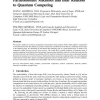Free Online Productivity Tools
i2Speak
i2Symbol
i2OCR
iTex2Img
iWeb2Print
iWeb2Shot
i2Type
iPdf2Split
iPdf2Merge
i2Bopomofo
i2Arabic
i2Style
i2Image
i2PDF
iLatex2Rtf
Sci2ools
162
click to vote
LOGCOM
2010
2010
Paraconsistent Machines and their Relation to Quantum Computing
We describe a method to axiomatize computations in deterministic Turing machines (TMs). When applied to computations in non-deterministic TMs, this method may produce contradictory (and therefore trivial) theories, considering classical logic as the underlying logic. By substituting in such theories the underlying logic by a paraconsistent logic we define a new computation model, the paraconsistent Turing machine. This model allows a partial simulation of superposed states of quantum computing. Such a feature allows the definition of paraconsistent algorithms which solve (with some restrictions) the well-known Deutsch's and Deutsch-Jozsa problems. This first model of computation, however, does not adequately represent the notions of entangled states and relative phase, which are key features in quantum computing. In this way, a more sharpened model of paraconsistent TMs is defined, which better approaches quantum computing features. Finally, we define complexity classes for such ...
Related Content
| Added | 20 May 2011 |
| Updated | 20 May 2011 |
| Type | Journal |
| Year | 2010 |
| Where | LOGCOM |
| Authors | Juan C. Agudelo, Walter Alexandre Carnielli |
Comments (0)

